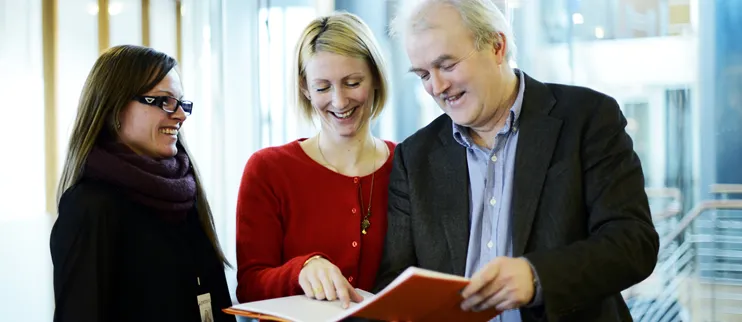SDFI and Petoro annual report 2012
Contents      | |||
Research and developmentThe oil companies devote some NOK 3 billion per year to petroleum-related research and development (R&D), and the supplies industry spends about NOK 1 billion. Through its interests in production licences, Petoro contributes to R&D by meeting its share of these costs in accordance with its participatory interest in the production licences, where the funds are managed by the respective operators. This amounts to more than NOK 500 million per annum. Qualifying new technological solutions for field application and their efficient implementation on fields represent a major challenge for the oil industry, including on the NCS. Many initiatives on the borderline between technology development and qualification are accordingly financed directly through projects and in day-to-day operation. The costs are carried on the investment budgets of the joint ventures. Qualification of subsea compression on Ormen Lange, Åsgard and Gullfaks, totalling NOK 7-8 billion over a five-year period, is a case in point. Petoro has worked for a number of years to secure faster adoption of technological opportunities and improved roll-out of new technologies in the production licences. The company’s commitment in 2012 focused particularly on maturing a pilot project for subsea compression on Ormen Lange. Petoro was a driving force in 2012 for the decision to install permanent subsea seismic cables on Snorre and Grane, and worked to persuade the Heidrun licence to assess the potential for such facilities. Efforts have been made by Petoro over a number of years to increase the pace of drilling on the big mature fields. Coiled tubing drilling is a technology which could help recovery from small well targets, while boosting the production contribution of new wells. Petoro worked in 2012 to persuade the Heidrun licence to approve a pilot project for coiled tubing drilling. | Corporate governanceThe board gives weight to good governance to ensure that the SDFI portfolio is managed in a way which maximises long-term value creation. Petoro’s management system is based on the Norwegian code of practice for corporate governance to the extent that the code’s recommendations are relevant to Petoro’s business and the frameworks established by the company’s form of organisation and ownership. Further developed in 2012, the management system simplifies the availability of management information and helps to concentrate attention on the attainment of company targets and on the risk picture at all times. Petoro seeks a corporate culture characterised by commitment and decisiveness within a good internal control regime. Its values base and ethics are embedded in its values and guidelines on business ethics. Work of the boardThe board held 13 meetings in 2012. An annual meeting and work plan has been established for the board, with the emphasis on the consideration of strategy, goals, budgets and interim results. The board is concerned with overall value creation from the total portfolio, and with ensuring that the state receives its rightful share and does not get charged a larger proportion of costs than is warranted. Balanced scorecards are a key instrument used by the board in following up the company’s results, and it measures the results achieved against established commercial and organisational goals. The board considers major investment decisions in the portfolio as well as following up and considering the commercial business, including monitoring Statoil’s duties under the marketing and sale instruction. It also monitors the company’s overall risk picture. The board ensures that control systems have been established and that the business is conducted in compliance with the company’s values base and guidelines on business ethics. | Guidelines for CSR were established by the board in 2012. Petoro’s CSR had previously found expression in the instructions issued by the board for its own work and that of the chief executive, and is also reflected in the company’s guidelines on business ethics. The board has maintained the practice of allocating preparatory work related to compensation arrangements to a sub-committee. Conflicts of interest are a fixed item on the agenda at board meetings, and directors with such a conflict withdraw from the board’s consideration of the relevant issue. The board conducts an annual evaluation of its own work. An external consultant assisted the board in conducting this self-assessment for 2012. The president and CEO has announced that he wishes to exercise his right to take early retirement, and will step down in June 2013. The board wishes to thank Kjell Pedersen for doing a good job in building up, positioning and running Petoro from its foundation in 2001. Work on appointing a new chief executive has been initiated by the board. Each director and the board as a collective body seek to strengthen their expertise in various ways. These include participation in courses and conferences and generally following developments in the area. The board conducted a study trip during the year to enhance its own expertise. Petoro’s board comprises Gunnar Berge as chair, Hilde Myrberg as deputy chair, Mari Thjømøe, Per Arvid Schøyen and Nils-Henrik M von der Fehr as the other shareholder-elected directors, and Anniken Teigen Gravem and Ragnar Sandvik as directors elected by and from among the employees. | |


